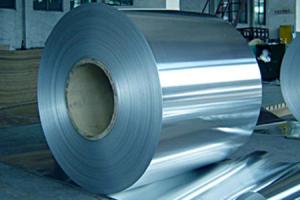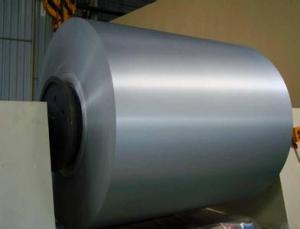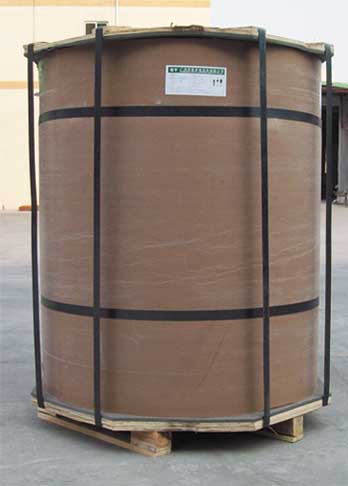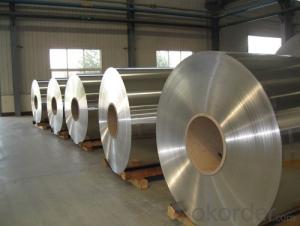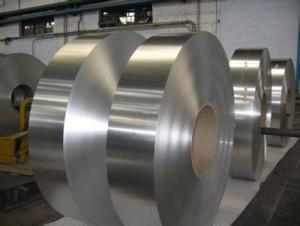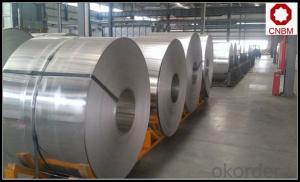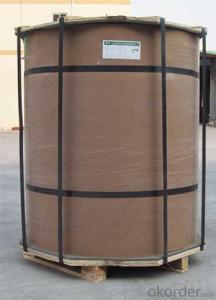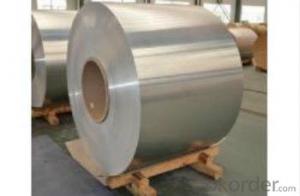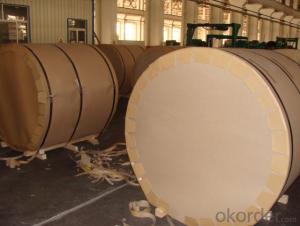1050 Aluminum Coil - Aluminum Strips Mill Finished 1xxx
- Loading Port:
- China Main Port
- Payment Terms:
- TT or LC
- Min Order Qty:
- 5 g/ft
- Supply Capability:
- 10000 g/ft/month
OKorder Service Pledge
OKorder Financial Service
You Might Also Like
1.Structure of Aluminum Strips Mill Finished 1XXX Description
Aluminum Strips Mill Finished 1XXX has great ductility, heat conductivity, anti-corrosion and moisture resistance properties.
Aluminum Strips Mill Finished 1XXX is widely used for electronics, instruments, lighting decoration, packing industry, house decoration, curtain wall, honeycomb-core panel, sandwich panel, aluminum composite panel and aluminum composite pipes.
2.Main Features of Aluminum Strips Mill Finished 1XXX
• Superior quality of raw material
• Reasonable and stable chemical composition
• Accurate tolerance
• Goode mechanical property
3.Aluminum Strips Mill Finished 1XXX Images
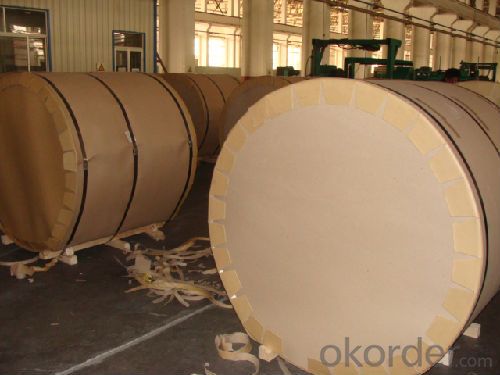
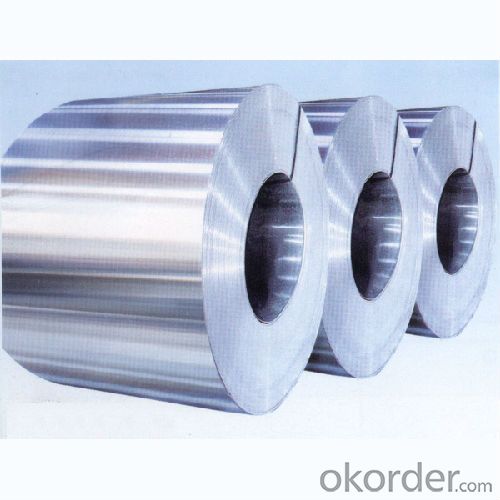
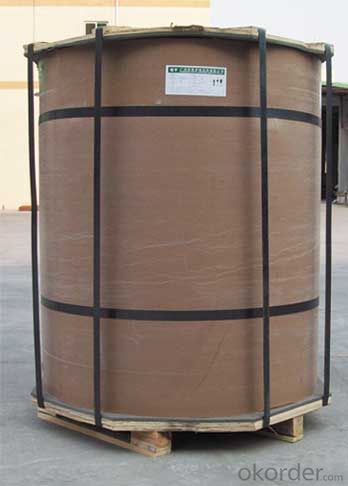
4.Aluminum Strips Mill Finished 1XXX Specification
| Alloy | AA1xxx (AA1050,AA1060,AA1070,AA1100 etc. |
| Temper | H14,H16,H18,H22,H24,H26,H32,O/F |
| Thickness | 0.2mm--100mm |
| Width | 30mm--1700mm |
| Standard | GB/T 3880-2006 |
5. FAQ of Aluminum Strips Mill Finished 1XXX
A.How to guarantee the quality?
Customers are welcome to our mill to visit and check the products. Besides, we can arrange a third party to test Aluminum Strips Mill Finished 1XXX products.
B.When will you deliver the products?
Aluminum Strips Mill Finished 1XXX will be delivered within 35 days after receiving advanced payment or original L/C.
- Q: Can aluminum coils be painted or coated with different colors?
- Yes, aluminum coils can be painted or coated with different colors. Aluminum is a versatile material that can be easily painted or coated to achieve the desired aesthetic appearance. The coil can be pre-painted or coated before it is formed into the desired shape, or it can be painted or coated after it has been formed into the desired shape. The paint or coating can be applied using various methods such as spraying, rolling, or dipping. Additionally, there are various types of paint or coating options available, including powder coating, liquid paint, or even anodizing, which can provide different colors, finishes, and levels of durability. Overall, painting or coating aluminum coils is a common practice to enhance their appearance and protect them from corrosion or other environmental factors.
- Q: What are the potential applications of coil-perforated aluminum coils?
- Coil-perforated aluminum coils have a wide range of potential applications due to their unique properties and capabilities. Some of the potential applications of these coils are: 1. Architectural Applications: Coil-perforated aluminum coils can be used in architectural projects for facades, cladding, and sunscreens. The perforations allow for the creation of decorative patterns and designs, while also providing functional benefits such as ventilation and light control. 2. Industrial Applications: These coils can be used in various industrial applications such as filtration systems, soundproofing panels, and heat exchangers. The perforations in the aluminum coils allow for the passage of air, sound, and heat, making them suitable for these purposes. 3. Automotive Industry: Coil-perforated aluminum coils can be utilized in the automotive industry for applications such as radiator grilles, speaker covers, and air vents. The perforations in the coils provide functional benefits like airflow, sound transmission, and aesthetic appeal. 4. HVAC Systems: These coils can be employed in heating, ventilation, and air conditioning (HVAC) systems. The perforations in the aluminum coils allow for improved airflow, which helps in efficient temperature regulation and air distribution within buildings. 5. Acoustic Panels: Coil-perforated aluminum coils can be used in the construction of acoustic panels, which are designed to absorb and reduce sound reflections in spaces like auditoriums, theaters, and recording studios. The perforations in the coils aid in sound absorption and diffusion. 6. Lighting Fixtures: These coils can be incorporated into lighting fixtures to create unique lighting effects. The perforations in the aluminum coils allow light to pass through, resulting in visually appealing patterns and designs. 7. Furniture and Decorative Applications: Coil-perforated aluminum coils can be utilized in the manufacturing of furniture, screens, partitions, and decorative elements. The perforations in the coils add a distinctive aesthetic appeal and can create interesting visual effects. Overall, the potential applications of coil-perforated aluminum coils are diverse and encompass various industries, including architecture, automotive, industrial, HVAC, acoustic, lighting, and furniture. The unique properties of these coils, such as their lightweight, durability, and aesthetic customization options, make them a versatile choice for many different uses.
- Q: What unique considerations or precautions need to be taken when handling aluminum coils?
- <p>When handling aluminum coils, there are several special requirements to consider. First, it's crucial to handle the coils carefully to avoid denting or scratching the surface, which can affect their quality and value. Secondly, due to aluminum's lightweight and high strength, specialized equipment like slitters and rewinders may be necessary to process the coils. Additionally, it's important to store aluminum coils in a dry environment to prevent corrosion. Proper ventilation is also required to avoid condensation, which can lead to oxidation. Finally, safety measures such as wearing protective gear and following material handling guidelines are essential to prevent accidents and injuries.</p>
- Q: aluminum foil production of ERP software, requiring a comprehensive production process, and have special assistance to pre operation, the best price is reasonable
- Baidu, Inc., a China military there, here not to send.
- Q: How are aluminum coils used in the production of beverage cans?
- Aluminum coils are used in the production of beverage cans as they are rolled into thin sheets and then shaped into the cylindrical form of a can. These coils provide the necessary material for manufacturing cans, allowing them to be lightweight, durable, and resistant to corrosion.
- Q: Are there any specific maintenance requirements for aluminum coils?
- Aluminum coils have specific maintenance requirements that must be met. These coils are commonly used in HVAC systems and need regular cleaning and maintenance to ensure they perform optimally and last a long time. Here are some of the maintenance tasks that should be done for aluminum coils: 1. Keep them clean: It is necessary to clean aluminum coils regularly to prevent the buildup of dirt, dust, and other contaminants. You can use a soft brush or a vacuum cleaner with a brush attachment to do this. Make sure to clean both the fins and the surface of the coils to ensure proper airflow. 2. Inspect them: Regularly inspecting aluminum coils is crucial to identify any signs of damage or corrosion. Look for bent fins, leaks, or any signs of wear and tear. If you notice any issues, address them immediately to prevent further damage. 3. Protect the coils: Applying a protective coating to aluminum coils can help prevent corrosion and extend their lifespan. There are various coatings available specifically designed for aluminum coils that provide an additional layer of protection against environmental factors. 4. Maintain air filters: The air filters in HVAC systems play a vital role in keeping the coils clean. Clean or replace the air filters regularly to prevent dust and debris from accumulating on the coils. Clogged filters can restrict airflow and reduce system efficiency. 5. Follow a maintenance schedule: It is crucial to establish a regular maintenance schedule to ensure all necessary tasks are completed on time. This schedule should include cleaning, inspection, and any other specific requirements recommended by the manufacturer. Consult the manufacturer's guidelines and recommendations for the specific maintenance requirements of your aluminum coils, as they may vary depending on the system and application. By following these maintenance requirements, you can ensure that your aluminum coils function efficiently and have a longer lifespan.
- Q: What are the different packaging options for aluminum coils?
- There are various packaging options available for aluminum coils to ensure their safety and convenience during transportation and storage. Some common packaging options include: 1. Wooden Crates: Aluminum coils are often packaged in wooden crates, which provide excellent protection against impacts and ensure the coils remain intact during transit. The crates are typically reinforced with steel bands for added strength and stability. 2. Cardboard Boxes: Smaller aluminum coils or coils intended for retail purposes are often packaged in cardboard boxes. These boxes are lightweight, cost-effective, and provide moderate protection against minor impacts. 3. Plastic Wrapping: Aluminum coils can also be wrapped in plastic film, which helps protect them from moisture, dust, and scratches. This packaging option is commonly used for coils that are transported in bulk or in situations where additional packaging is not required. 4. Metal or Composite Tubes: In some cases, aluminum coils are packaged in metal or composite tubes. These tubes are sturdy and provide excellent protection against external forces. They are often used for coils with large diameters or longer lengths. 5. Customized Packaging: Depending on the specific requirements of the customer or industry, customized packaging options can be designed. This may include the use of foam or cushioning materials to provide additional protection, or the incorporation of specialized features such as moisture-resistant barriers. It is important to choose packaging options that best suit the specific needs of the aluminum coils, considering factors such as coil size, weight, transportation conditions, and storage requirements.
- Q: Suppose a cube of aluminum which is 1.00 cm on a side accumulates a net charge of +1.50 pC.(a) What percentage of the electrons originally in the cube was removed?(b) By what percentage has the mass of the cube decreased because of this removal?So for a you need to find total number of electrons removed (which gives it the +1.5 pC charge), and divide that by the number of total electrons in Aluminum right? 13 electrons in Aluminum..and i really don't know much else on this. I've been searching the internet for hours man
- One approach to this can use the density of aluminum to find the mass of the1 cm? block. The density of aluminum is 2.70-g/cm? so your cube has a mas of 2.70-g. The number of aluminum atoms in this block is: 2.7-g Al x (1 mol Al / 27.0-g Al) x (6.023 X 10?? atoms Al / 1 mol Al) = 6.023 x 10?? atoms Al. Each Al, as you pointed out, contains 13 electrons so we have 6.023 x 10?? atoms Al x 13 electron/atom = 7.83 x 10?? electrons. 1 x 10?? pC = 1 C and 1 C = 6.24 x 10?? electrons=== 1.5 pC x (1C / 1 x 10?? pC) x ( 6.24 x 10?? electrons / 1 C) = 9.36 x 10? electrons a.) % removed = 9.36 x 10? / 7.83 x 10?? x 100% = 1.2 x 10??? % b.) Each electron has a mass of 9.11 x 10???-g , so the total mass removed =9.11 x 10???-g/elec x 9.36 x 10? electrons = 8.53 x 10???-g. Thus the % decrease is (8.53 x 10???-g/ 2.7-g) x 100% = 3.16 x 10??? %
- Q: Are aluminum coils suitable for low-maintenance applications?
- Yes, aluminum coils are suitable for low-maintenance applications. Aluminum is a durable and corrosion-resistant material, requiring minimal upkeep. It does not rust, is resistant to weathering, and can withstand harsh environments. Additionally, aluminum coils are lightweight and easy to handle, making them a convenient choice for low-maintenance applications.
- Q: This question asks for methods to clean an aluminum coil, which involves understanding the appropriate cleaning materials and techniques to avoid damaging the aluminum.
- <p>To clean an aluminum coil, start by using a soft cloth or sponge dampened with warm water and mild dish soap. Gently wipe the coil to remove dirt and grime. Avoid abrasive materials or harsh chemicals that could scratch the surface. After cleaning, rinse the coil thoroughly with clean water to remove any soap residue. Dry the coil completely to prevent water spots or corrosion. For stubborn stains, consider using a specialized aluminum cleaner, but always follow the manufacturer's instructions and test on a small area first.</p>
Send your message to us
1050 Aluminum Coil - Aluminum Strips Mill Finished 1xxx
- Loading Port:
- China Main Port
- Payment Terms:
- TT or LC
- Min Order Qty:
- 5 g/ft
- Supply Capability:
- 10000 g/ft/month
OKorder Service Pledge
OKorder Financial Service
Similar products
Hot products
Hot Searches
Related keywords
